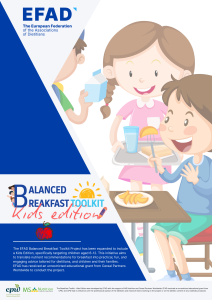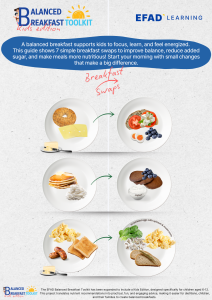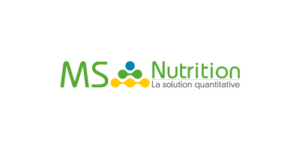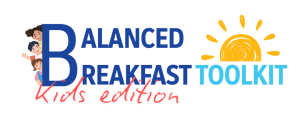The EFAD Breakfast Toolkit Project has been expanded to include a Kids Edition, specifically targeting children aged 6-12. This initiative aims to translate nutrient recommendations for breakfast into practical, fun, and engaging advice tailored for young individuals and their families. The Kids Edition focuses on interactive materials, colourful visuals, and engaging activities to educate dietitians, children and their families about the importance of a nutritious breakfast. This project empowers the next generation to cultivate healthy habits that can last a lifetime.
Project Outcomes
The project is comprised of three key components:
- Breakfast Toolkit – Kids Edition: Understanding the Needs of Children and Families.
We gathered insights to better support children and their families in making informed breakfast choices and cultivating healthy habits.
You can download it below.
- Interactive Educational Materials – Social Media Posts:
We created engaging and colourful resources in the form of social media posts that encourage children to explore nutritious food options and participate in breakfast preparation.
These are available at the EFAD Learning Platform.
- Breakfast Education Resources:
We collated educational content on breakfast science to empower families and dietitians in promoting healthy breakfast practices among children.
These are available at the EFAD Learning Platform.
Background
Cereals Partners Worldwide set up the IBRI in 2016, a project led by recognised nutrition experts, to develop nutrient recommendations for a balanced breakfast, based on established daily nutritional guidelines and the observed nutritional contribution of breakfast.
The Breakfast Toolkit Kids Edition can be downloaded here:
Download and explore the Balanced Breakfast Toolkit – the Kids Edition
7 Swapping Ideas for a Balanced Breakfast:
A printable set of seven side-by-side breakfast swaps, created to help families of children aged 6–12 make small, realistic changes with big nutritional impact. Each visual highlights improvements in fibre and protein, better macronutrient balance, and reduced free sugars and is supported by the EFAD Breakfast Quality Score and MS Nutrition Breakfast Calculator. You can download, print, and use in consultation practise, schools, and parent sessions.
How to use:
- Share in family consultations and school-based workshops.
- Print for clinic handouts or classroom displays.
- Embed in newsletters, blogs, or presentations on child nutrition.
Who it’s for: Dietitians, educators, and caregivers looking for practical, visual tools to make breakfast improvements easy and engaging for children.
The Balanced Breakfast Toolkit Kids Edition translates breakfast recommendations into colourful, interactive materials to support dietitians and families in building lasting healthy habits. Additional social media resources and background education are available via the EFAD Learning Platform.
Download and explore the Swapping Ideas
Partners and Supporters
![]()


The Breakfast Toolkit was developed by EFAD.
Our work was supported by MS Nutrition, offering its unique modeling and statistics expertise and creating the Breakfast Calculator.
Our sincere appreciation goes out to CPW for providing the EFAD with an unrestricted educational grant.
CPW had no influence on the professional opinions of the dietitians and research teams involved in this project, nor on the content of these materials relating to dietetics.



